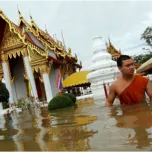As I sat in the enormous main hall of BMA house yesterday at the BMJ’s conference ‘Health and Security perspectives on Climate Change’, on Monday, Thailand was beginning to come to terms with the worst floods in several decades, with at least 315 dead and the finance minister predicting 1-1.7% of Thai growth lost and a cost of $3.3bn in reconstruction. In Honduras and around six days of heavy rains that have caused landslides, flooding and at least 66 people have died.
Similar stories are being repeated globally, and at increasing frequency, yet even when we hear about them the likely link to climate change often goes unspoken, because non one can prove a given event is a direct effect of climate change, only that together they fit a pattern consistent with the sort of changes predicted by climate scientists – and the upper end of the sensitivity levels at that. So to be at a conference on that subject, probably with the dubious honour of being the youngest person of some 300 delegates from the health sector, press, military, councils, campaign groups, NGOs and businesses, was pretty exciting.
[ibimage==2234==content_image_half_width==none==self==ibimage_float_right]The focus of the day was on the implications of climate change for both medical and military walks of life, and the potential connections between them, and for me this was a new slant that surprised me at first. When a delegate suggested they might have some trouble selling the idea of ‘killing people in a greener way,’ the idea that forging a relationship with the military to address climate change seemed a bit of an unholy alliance, but much as I disagreed with one speaker’s insinuation that the army’s primary role was ‘conflict resolution’ - as one speaker pointed out, the two are both fundamentally about life and death. And the uncomfortable truth is that climate change is going to make both of their jobs much harder in the future.
But more than the effect we will experience in the not-so-far-away future, the day provided compelling evidence that climate change is already affecting health and security in many parts of the world. From droughts in Darfur, Somalia and much of Sub-Saharan Africa to the floods in Pakistan and Bangladesh, the 2010 heatwave in Russia and fires and drought in Australia, it sometimes strikes me that the phrases ‘worst on record,’ ‘in living memory’ and ‘catastrophic’ are almost becoming devoid of meaning we seem to hear them so often.
It’s easy, faced with such facts, to act as if it all weren’t true, just as we wish it weren’t. Half the battle is psychological – we could change enough but it doesn’t mean we’re prepared to, and we need strong, rapid and collective action – and the day was a portrait of a deeply concerning reality for the coming decades, bringing up some very challenging questions. These challenges are not matched in scale by enough serious, viable solutions, but organisations such as the Centre for Sustainable Healthcare and many of the others who partnered the conference are proof that some people are working hard to help us make the transition to a more sustainable and safer society. I came away from the day feeling energised and reassured that Climate Change and Health is no longer a fringe issue, as when I first got involved in 2010, and with much more concrete plans for what I could do.
Prof. Hugh Montgomery, whose idea (together with Rear Admiral Neil Morisetti) the day was, gave a sobering final remark that he didn’t know what the answer was, but made a compelling plea that everyone in the room should think what they’re really good at and make a real commitment to themselves to use that to help safeguard the climate. Not a bad message for anyone really.
Isobel Braithwaite (medical student)
Images:
- Source: http://www.abc.net.au/am/ content/2011/s3335211.htm
- A solar array owned by the US’ Department of Defense. Source: greenbang.com

Please log in or sign up to comment.